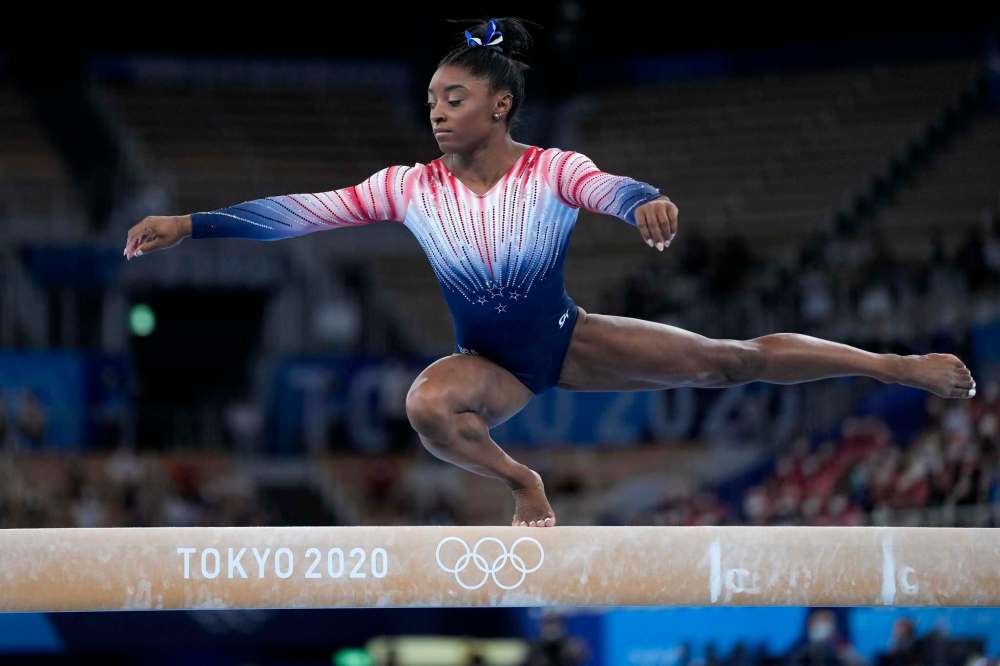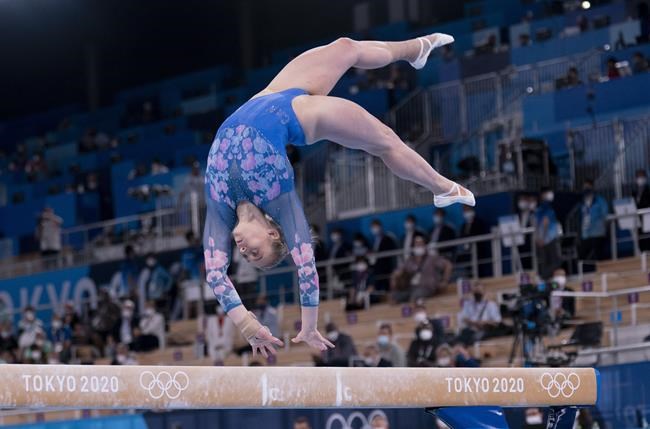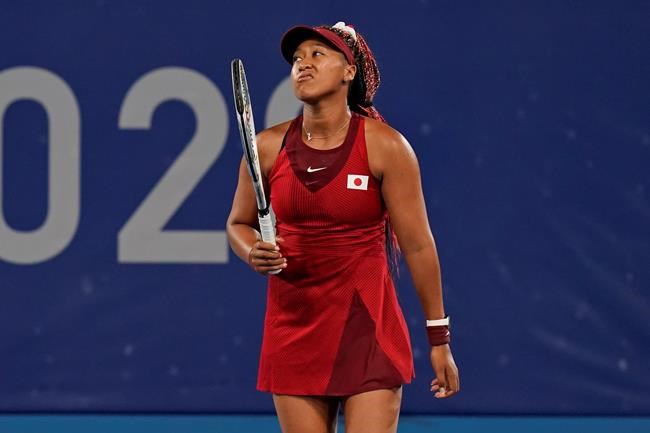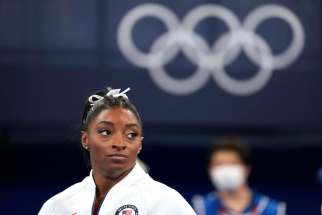Biles deserves a medal for showing us her humanity
Read this article for free:
or
Already have an account? Log in here »
To continue reading, please subscribe:
Monthly Digital Subscription
$0 for the first 4 weeks*
- Enjoy unlimited reading on winnipegfreepress.com
- Read the E-Edition, our digital replica newspaper
- Access News Break, our award-winning app
- Play interactive puzzles
*No charge for 4 weeks then price increases to the regular rate of $19.00 plus GST every four weeks. Offer available to new and qualified returning subscribers only. Cancel any time.
Monthly Digital Subscription
$4.75/week*
- Enjoy unlimited reading on winnipegfreepress.com
- Read the E-Edition, our digital replica newspaper
- Access News Break, our award-winning app
- Play interactive puzzles
*Billed as $19 plus GST every four weeks. Cancel any time.
To continue reading, please subscribe:
Add Free Press access to your Brandon Sun subscription for only an additional
$1 for the first 4 weeks*
*Your next subscription payment will increase by $1.00 and you will be charged $16.99 plus GST for four weeks. After four weeks, your payment will increase to $23.99 plus GST every four weeks.
Read unlimited articles for free today:
or
Already have an account? Log in here »
Hey there, time traveller!
This article was published 05/08/2021 (1593 days ago), so information in it may no longer be current.
Which Olympic games were more successful? Was it the 2016 summer games in Rio de Janeiro, where American gymnast Simone Biles was fêted with multiple gold medals, securing her place as the greatest female gymnast of all time?
Or was it these Olympics in Tokyo, where Biles withdrew from the team final in order to protect her mental health (and still medalled, by the way)?
If you ask Winnipeg sports psychologist Dr. Adrienne Leslie-Toogood, it’s the latter.
Leslie-Toogood is the director of sport psychology for the Canadian Sport Centre Manitoba, the current chair of Canadian Sport Psychology Association and a former athlete herself who has spent her career working with high-performance athletes at all levels. She posed that very question on her blog, and her answer was poignant: Yes, Biles walked away from competition. But she also walked back, ultimately winning a bronze medal on the balance beam. “That takes incredible courage,” Leslie-Toogood wrote. “Too many of us do not return when we are not sure how it will turn out.”

When we connect for a Zoom call, Leslie-Toogood was thinking about another Olympic gymnast who made a stunning comeback on the beam: Canada’s Ellie Black, who returned to competition after an ankle injury and just missed the podium, placing fourth.
“She’s returning from a physical injury, and then you have Simone Biles returning from a mental or emotional injury,” she says. “Both are challenging, but I think we’re much more comfortable talking about the heroism with Ellie Black. And I think both performances were heroic. Anyone who’s had a mental health struggle or challenge and had to show up just for work, let alone with the world watching, knowing that you’re probably not going to be your best, you’re probably not going to win — that takes courage. And I think that’s an unbelievable role model. (Biles) showed up, and she smiled, and she was proud of herself for winning the bronze because that was the best she could do that day.”
A few weeks prior to Biles’ high-profile withdrawal, another young woman at the tippy-top of her sport, tennis star Naomi Osaka, ultimately withdrew from the French Open after announcing she wouldn’t be doing press due to anxiety. Both exits made headlines, and sparked important conversations about sport and mental health.

“I often think that sport is a microcosm for society, and the conversations we’re having in sport are conversations we’re having in a larger world,” Leslie-Toogood says. “And so, if you look at work environments, we’re talking a lot about psychological safety and we’re talking a lot about diversity and inclusion. I think mental health is something we’re not super comfortable with. We talk about the fact that we’re comfortable with it, but I don’t think we really are. And there’s still a lot of stigma. But if we look at the physical metaphor, if you’re feeling ill or you have an injury, you go get treated and you don’t spend a lot of time thinking about whether or not you need to get it treated.”
During the pandemic, Leslie-Toogood delivered the first in a webinar series called Coaching Through COVID. In it, she talked about the hidden gifts of the pandemic, the lessons we could take from this time. (It’s worth remembering that the circumstances around this particular Olympic Games are far from usual thanks to COVID-19.)
“One of the things that I thought was one of the hidden gifts was the fact that, in high performance sports and high performance environments, we often don’t really notice the human being,” she says. “We’re so focused on results, and technical, and all of those elements — but we disregard emotion and humanity. We just don’t even talk about it, we don’t even know it. And if it shows up, we just don’t want to deal with it.”
“That’s when greatness happens, when there’s not as much on the line. When your entire identity is on the line, you start to hold back and you start to not deal with their pressure quite as well.” – sports psychologist Dr. Adrienne Leslie-Toogood
The pandemic, she says, has forced us to deal with it and acknowledge, like all humans, high-performers have good and bad days, their best might look different every day, and that they too have breaking points.
For many high-performance athletes, it can he hard to separate who they are from what they do, especially since their formative years are spent honing and perfecting their sport. Many gymnasts, for example, become Olympic athletes when they are still teenagers.
“When what you do becomes who you are, that’s a really tough situation,” Leslie-Toogood says. “And from a world perspective, it we actually don’t want that, because we know we get best performance when people do separate who they are from what they do. That’s when greatness happens, when there’s not as much on the line. When your entire identity is on the line, you start to hold back and you start to not deal with their pressure quite as well.”
And if you’re a Simone Biles or a Naomi Osaka, that pressure is beyond what most of us can imagine. “Simone Biles was told she let her country down,” Leslie-Toogood says. “That’s a big burden for a young person to carry.”

But Biles showed up. She showed up for her teammates by supporting them, and she also showed up for herself when she made the decision to make her mental health a priority. She displayed strength and character by showing us her humanity.
Leslie-Toogood has been thinking a lot about how to create spaces in sport where “people can bring their whole self and be the best version of themselves.”
“One of the phrases that I’ve used lately when I’ve done some presentations is the idea of creating a human-first brave space,” she says. “A space where people are willing to try, to challenge, to fail— then we have high-performing environments.
“Kudos to whoever surrounds Simone Biles and Naomi Osaka — they provided them with a space to be brave. We’ll all be better off for it down the road.”
jen.zoratti@freepress.mb.ca
Twitter: @JenZoratt

Jen Zoratti is a Winnipeg Free Press columnist and author of the newsletter, NEXT, a weekly look towards a post-pandemic future.
Our newsroom depends on a growing audience of readers to power our journalism. If you are not a paid reader, please consider becoming a subscriber.
Our newsroom depends on its audience of readers to power our journalism. Thank you for your support.





